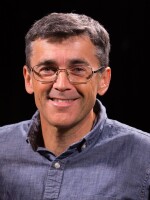The Ohio Valley ReSource marks its fifth anniversary this month. With your help, this collaboration among seven public media stations in three states is still doing the job it set out to do in June, 2016: to tell the untold stories in the under-served parts of our region.
On June 17, 2016, the ReSource published its first story, a piece about problems with the disposal of radioactive waste generated by the gas drilling technique known as fracking.
The package of stories tracked a load of “hot” waste as it crossed state lines from drilling pads to a West Virginia processing facility and finally to a landfill in Estill County, Kentucky. The landfill was not supposed to take that sort of waste. It was also close to two schools and several homes, where a resident concerned for her family’s safety told us it felt like “the henhouse was not guarded and the fox got in.”
We might not have known it at the time, but that first story from our collaborative journalism enterprise contained many of the elements that would become hallmarks of our journalism for years to come:
It reflected a commitment to investigation and explanation of big issues.
It brought a regional perspective to common challenges for communities around the Ohio Valley.
It resulted from a partnership with another news organization, the Center for Public Integrity.
And it showed a propensity for puns and wordplay. (The headline of that first story? “Hot Mess.”)
Five years later we’re still tackling the big issues in the Ohio Valley: public health, the region’s energy transition, infrastructure failures, our food system, the opioid crisis, and more.
We tell these stories from the community perspective — because we live and work in the communities we report on — and we stick to the stories that matter over time. (In an ironic twist, a recent episode of our podcast focuses on much the same topic as did that very first story, the continuing environmental and public health challenges associated with fracking.)
Partnerships continue to play a big role in our work. For example, we partnered again with Center for Public Integrity and our colleagues at the Kentucky Center for Investigative Reporting for a series on worker safety issues in Kentucky, highlighting serious flaws in the state’s program for preventing workplace fatalities.
In 2016 we partnered with NPR investigative reporter Howard Berkes to investigate the nonpayment of roughly $15 million in taxes and fines by the companies belonging to coal executive — and now West Virginia Governor — Jim Justice.
We worked with NPR and Berkes again to investigate the deadly resurgence of black lung disease among coal miners, an ongoing issue we have committed to covering for as long as it takes.
We’ve also partnered with the Solutions Journalism Network to focus on the many ways that people here are working for solutions, such as the collective of rural schools in eastern Kentucky who are not only improving education but increasing the chances that towns can develop more diverse and sustainable economies.
We also get ambitious, stretching into new ways to better tell the full story of our region, such as with our book, “Appalachian Fall,” published last year.
Oh, and the wordplay? Yeah, we still do some of that, too. (A story about tariffs on steel and aluminum imports, for example, included section headlines “Steely Ban” and “Aluminum, Foiled.” You’re welcome.)
In a June 9, 2016, web post announcing the ReSource’s arrival, I wrote that “our goal is to promote understanding, engagement, and a cross-pollination of ideas among those tackling the region’s toughest problems.”
And I said that while much of our work will focus on the real but hidden costs of the region’s extractive industries, we would do our work with an understanding that “the region’s historic contributions to the country are also real and deserve recognition.
“These connections among economic activity, cultural identity, and social change will be at the core of our journalism.”
Five years on, that’s just what we’re doing, thanks to a great team of dedicated, talented journalists; a solid partnership of visionary public media leaders; support from important institutions, such as the Corporation for Public Broadcasting; and you.
Yes, you!
You know what we like to say: You are the public in public media. Through your support for our partner stations, you have made the ReSource possible. Thank you! And, as I wrote five years ago, I hope you find this ReSource a valuable one.





